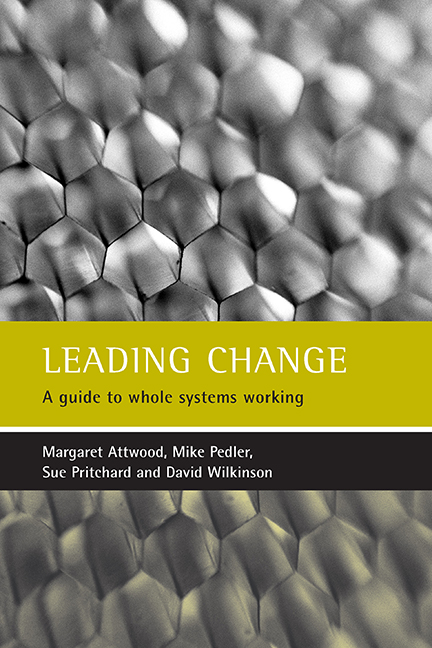Book contents
- Frontmatter
- Contents
- Foreword
- Foreword
- Prologue
- one Why do we need whole systems change?
- Two How Do We Put These Fine Words Intoaction? An Overview of Whole Systems Development
- Three The emerging practice of wholesystems development
- Four Leadership: keeping the big picture in view
- Five Public learning
- Six Valuing difference and diversity: getting the whole systeminto the room
- Seven Meeting differently: large and small group working
- Eight Follow-through and sticking with it
- Nine From organisations to networks
- Ten Confirming cases: local problems andlocal solutions within whole systems
- Epilogue
- Bibliography
- Index
Five - Public learning
Published online by Cambridge University Press: 20 January 2022
- Frontmatter
- Contents
- Foreword
- Foreword
- Prologue
- one Why do we need whole systems change?
- Two How Do We Put These Fine Words Intoaction? An Overview of Whole Systems Development
- Three The emerging practice of wholesystems development
- Four Leadership: keeping the big picture in view
- Five Public learning
- Six Valuing difference and diversity: getting the whole systeminto the room
- Seven Meeting differently: large and small group working
- Eight Follow-through and sticking with it
- Nine From organisations to networks
- Ten Confirming cases: local problems andlocal solutions within whole systems
- Epilogue
- Bibliography
- Index
Summary
The story of Gladwell in Chapter Three illustrated that organisational learning:
… is not the same thing as individual learning, even when the individuals who learn are members of the organisation. There are too many cases in which organisations know less than their members. There are even cases in which the organisation cannot seem to learn what every member knows.(Argyris and Schon, 1978, p 9)
If this is true for the state of collective knowledge in organisations, it is even truer of systems. Separated by the boundaries of organisations, and with different ways of seeing based on culture, tradition and experience, people find it difficult,if not impossible, to create the shared meanings necessary to grapple effectively with the issues facing organisations as they strive to serve customers, communities and individual citizens more effectively. As a society, we have invested massively in transferring knowledge about how to organise health and social care, housing, education and other public services. Think about all the education and training processes devoted to these ends. However, most of this wisdom is created and disseminated through the separate silos of higher education institutions and professional bodies. Historically, academically, professionally and managerially, there has been territoriality or a tendency to look inward rather than to consider what to share with others so that understanding can be strengthened. “The world has problems, but universities have departments” (Brewer, 1999, p 328). We lack ways of connecting knowledge, which would assist understanding of ways in which changes in one part of society impact elsewhere. Yet, ironically, the need to develop this connectedness has never been greater. The ‘closely coupled’ nature of society means that changes introduced in one place quicklyhave an impact elsewhere.
This affects all of us. For example, the culture of long hours and the stressexperienced by many parents leads to the development of ‘parental time deficit’,where insufficient time is spent with children. Even when families have timetogether, parents can be tired and stressed, with obvious consequences for thedevelopment of their children. Alongside this, many schools are reportingincreased exclusions of pupils because of unacceptably disruptive behaviour.This is not just a response to the publication of league tables of examperformance.
- Type
- Chapter
- Information
- Leading ChangeA Guide to Whole Systems Working, pp. 77 - 94Publisher: Bristol University PressPrint publication year: 2003



